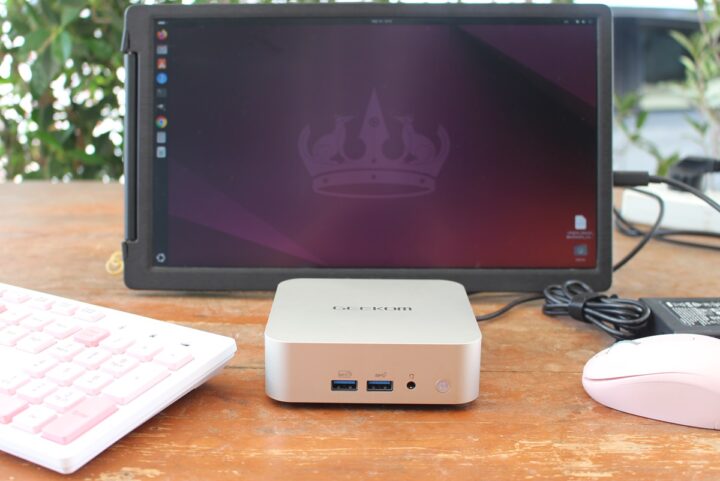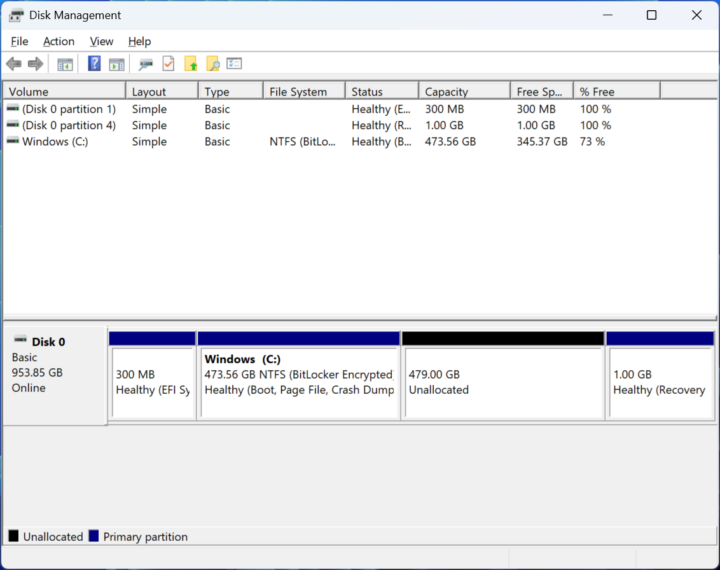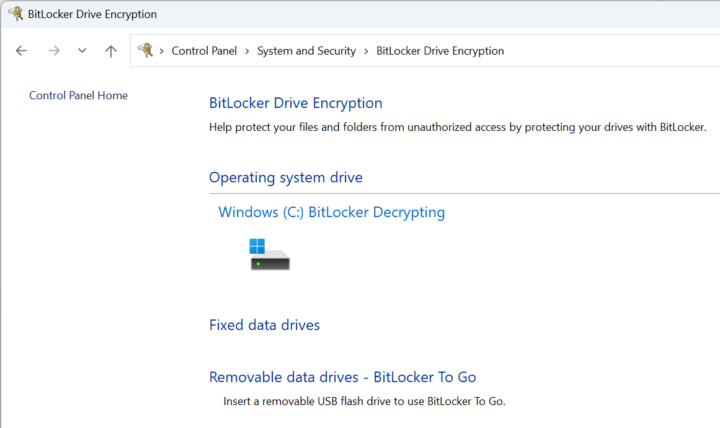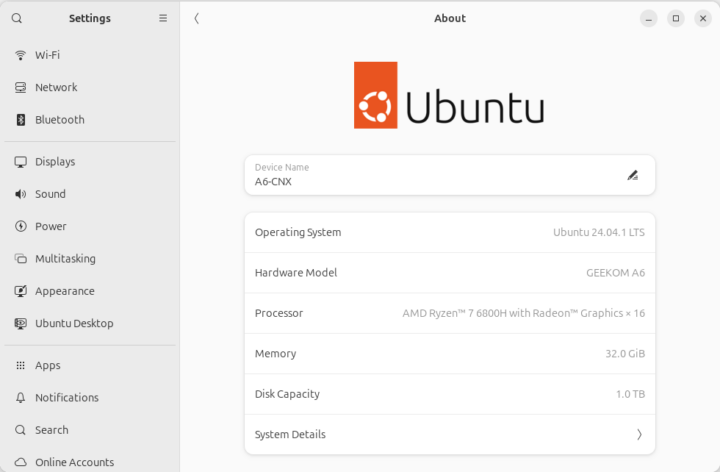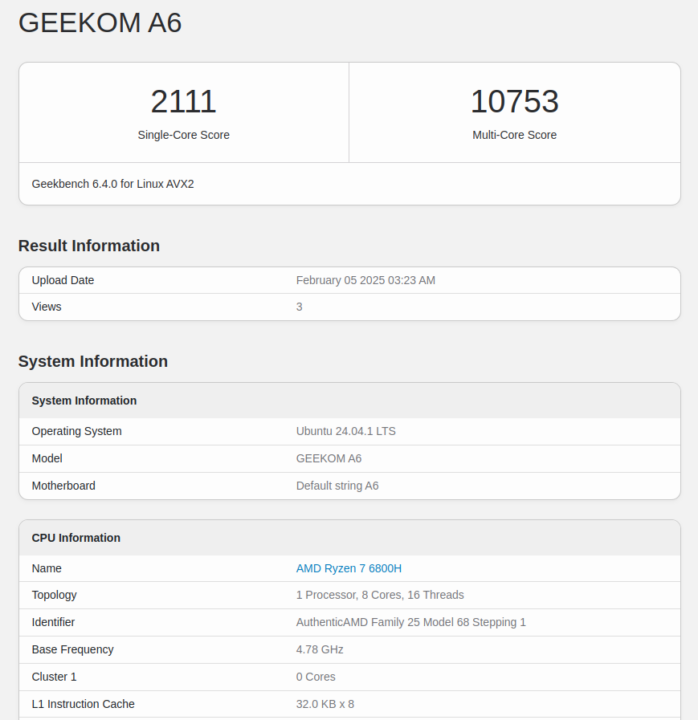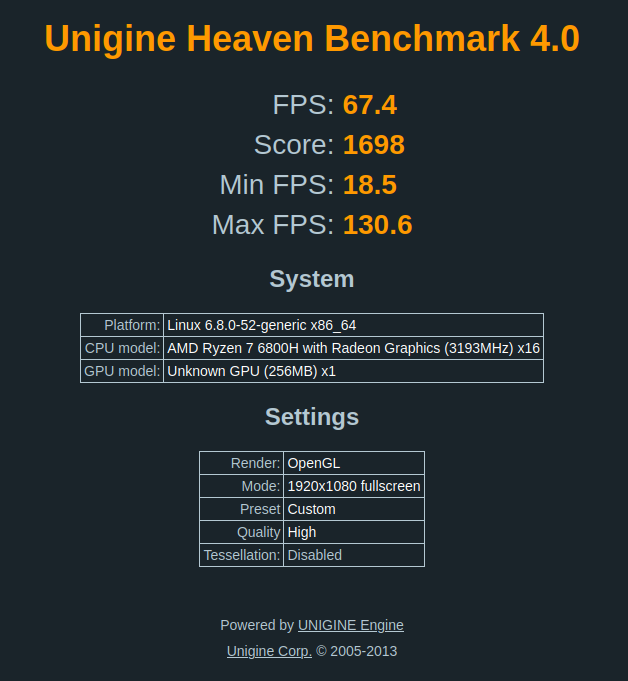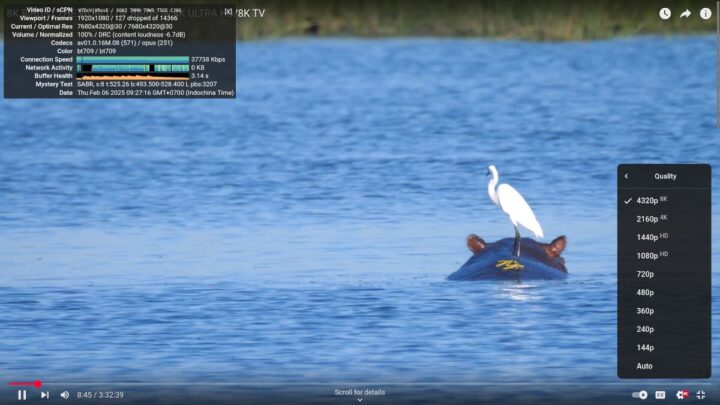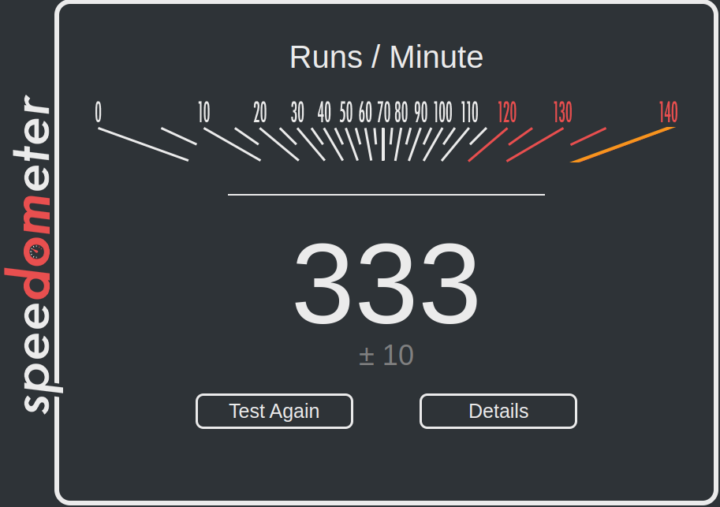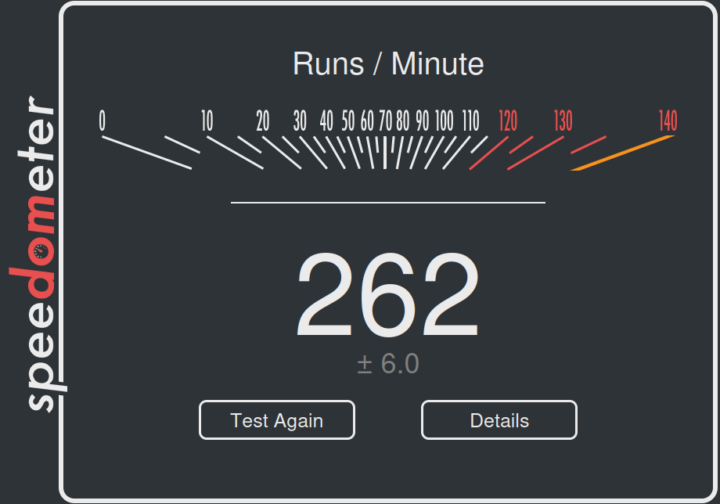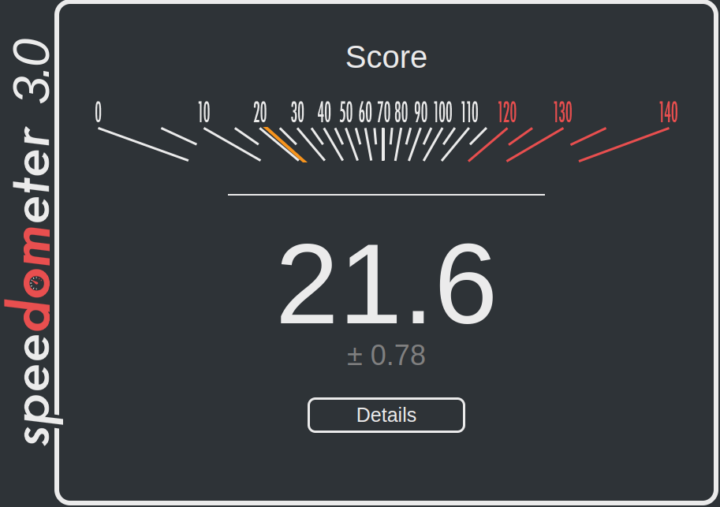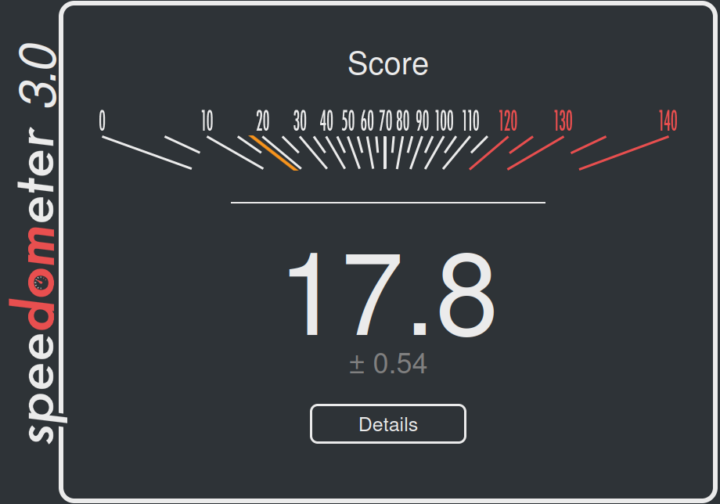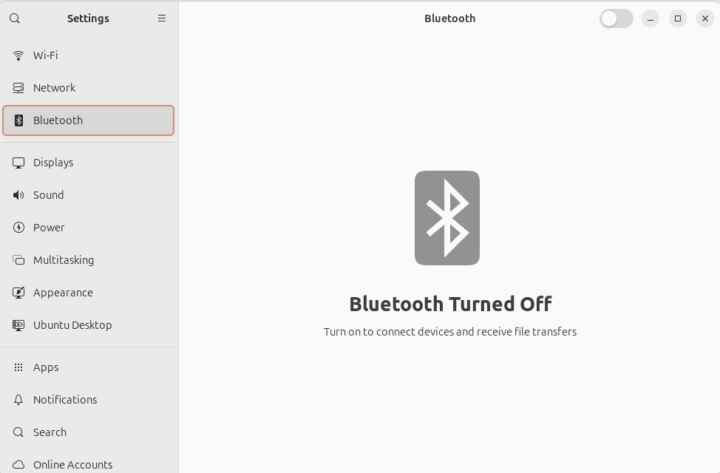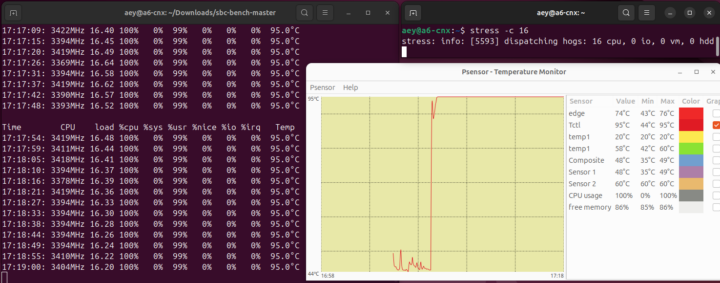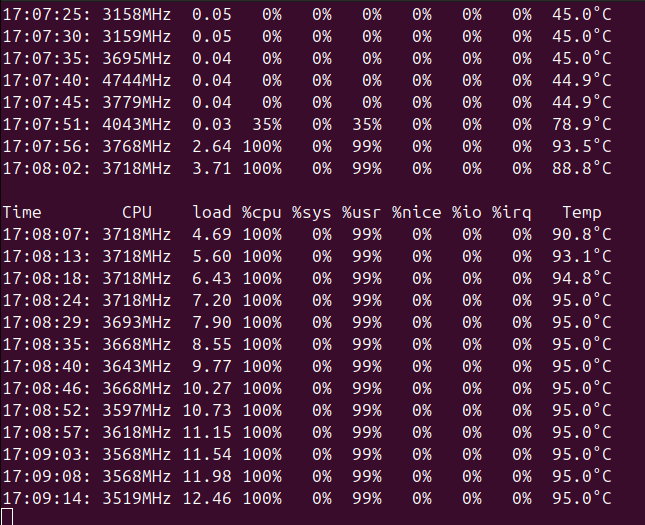We’ve already checked out the hardware of the GEEKOM A6 mini PC with an unboxing and teardown in the first part of the review, and thoroughly tested the AMD Ryzen 7 6800H mini PC in Windows 11 Pro in the second part, so it’s now time to report our experience with Ubuntu 24.04 Linux on the mid-range mini PC.
We’ve gone through features testing, system benchmarks, storage (SSD and USB) performance tests, 2.5GbE and WiFi 6 network evaluation, 4K and 8K YouTube video playback, a stress test to check out the cooling ability of the mini PC, and finally fan noise and power consumption measurements.
Ubuntu 24.04 installation and system information
Since we wanted to install Ubuntu 24.04.1 LTS alongside Windows 11 Pro, we resized the partition by roughly half.
But since the C: drive was “BitLocker Encrypted”, we knew Ubuntu installation wouldn’t be successful that way, so we went to the Settings to disable BitLocker Driver Encryption.
Once done, we prepared a USB flash drive with the Ubuntu 24.04.1 ISO (since Ubuntu 24.04.2 was not released yet and even delayed), and could install the OS without issues.
Going to Settings -> About confirms we have a GEEKOM A6 computer running Ubuntu 24.04.1 LTS on a 16-thread AMD Ryzen 7 6800H with Radeon Graphics coupled wth 32GB RAM and a 1TB SSD.
We can get a few more details in the terminal:
|
1 2 3 4 5 6 7 8 9 10 11 12 13 14 15 16 17 18 19 20 |
aey@TO-FP750-CNX:~$ cat /etc/lsb-release DISTRIB_ID=Ubuntu DISTRIB_RELEASE=24.04 DISTRIB_CODENAME=noble DISTRIB_DESCRIPTION="Ubuntu 24.04.1 LTS" aey@TO-FP750-CNX:~$ uname -a Linux TO-FP750-CNX 6.8.0-41-generic #41-Ubuntu SMP PREEMPT_DYNAMIC Fri Aug 2 20:41:06 UTC 2024 x86_64 x86_64 x86_64 GNU/Linux aey@TO-FP750-CNX:~$ free -mh total used free shared buff/cache available Mem: 27Gi 4.1Gi 20Gi 174Mi 3.0Gi 23Gi Swap: 8.0Gi 0B 8.0Gi aey@TO-FP750-CNX:~$ df -mh Filesystem Size Used Avail Use% Mounted on tmpfs 2.8G 2.5M 2.8G 1% /run /dev/nvme0n1p5 233G 15G 207G 7% / tmpfs 14G 78M 14G 1% /dev/shm tmpfs 5.0M 16K 5.0M 1% /run/lock efivarfs 128K 24K 100K 20% /sys/firmware/efi/efivars /dev/nvme0n1p1 96M 33M 64M 34% /boot/efi tmpfs 2.8G 2.6M 2.8G 1% /run/user/1000 |
And even more with inxi utility:
|
1 2 3 4 5 6 7 8 9 10 11 12 13 14 15 16 17 18 19 20 21 22 23 24 25 26 27 28 29 30 31 32 33 34 35 36 37 38 39 40 41 42 43 44 45 46 47 48 49 50 51 52 53 54 55 56 |
aey@a6-cnx:~$ inxi -Fc0 System: Host: a6-cnx Kernel: 6.8.0-52-generic arch: x86_64 bits: 64 Desktop: GNOME v: 46.0 Distro: Ubuntu 24.04.1 LTS (Noble Numbat) Machine: Type: Desktop System: GEEKOM product: A6 v: N/A serial: <superuser required> Mobo: N/A model: A6 serial: <superuser required> UEFI: American Megatrends LLC. v: 2.38 date: 12/17/2024 CPU: Info: 8-core model: AMD Ryzen 7 6800H with Radeon Graphics bits: 64 type: MT MCP cache: L2: 4 MiB Speed (MHz): avg: 978 min/max: 400/4785 cores: 1: 400 2: 400 3: 2389 4: 2528 5: 2053 6: 400 7: 1823 8: 400 9: 400 10: 2463 11: 400 12: 400 13: 400 14: 400 15: 400 16: 400 Graphics: Device-1: AMD Rembrandt [Radeon 680M] driver: amdgpu v: kernel Display: wayland server: X.Org v: 23.2.6 with: Xwayland v: 23.2.6 compositor: gnome-shell driver: dri: radeonsi gpu: amdgpu resolution: 1920x1080~60Hz API: EGL v: 1.5 drivers: kms_swrast,radeonsi,swrast platforms: gbm,wayland,x11,surfaceless,device API: OpenGL v: 4.6 compat-v: 4.5 vendor: amd mesa v: 24.2.8-1ubuntu1~24.04.1 renderer: AMD Radeon 680M (radeonsi rembrandt LLVM 19.1.1 DRM 3.57 6.8.0-52-generic) Audio: Device-1: AMD Rembrandt Radeon High Definition Audio driver: snd_hda_intel Device-2: AMD Family 17h/19h HD Audio driver: snd_hda_intel API: ALSA v: k6.8.0-52-generic status: kernel-api Server-1: PipeWire v: 1.0.5 status: active Network: Device-1: Realtek RTL8125 2.5GbE driver: r8169 IF: eno1 state: down mac: 38:f7:cd:cd:55:de Device-2: MEDIATEK MT7922 802.11ax PCI Express Wireless Network Adapter driver: mt7921e IF: wlp2s0 state: up mac: 60:ff:9e:29:2e:1a Bluetooth: Device-1: IMC Networks Wireless_Device driver: btusb type: USB Report: hciconfig ID: hci0 rfk-id: 0 state: down bt-service: enabled,running rfk-block: hardware: no software: no address: 00:00:00:00:00:00 Drives: Local Storage: total: 953.87 GiB used: 14.72 GiB (1.5%) ID-1: /dev/nvme0n1 vendor: Kingston model: OM8PGP41024N-A0 size: 953.87 GiB Partition: ID-1: / size: 470.41 GiB used: 14.63 GiB (3.1%) fs: ext4 dev: /dev/nvme0n1p5 ID-2: /boot/efi size: 296 MiB used: 86.8 MiB (29.3%) fs: vfat dev: /dev/nvme0n1p1 Swap: ID-1: swap-1 type: file size: 8 GiB used: 0 KiB (0.0%) file: /swap.img Sensors: System Temperatures: cpu: 43.5 C mobo: 42.0 C gpu: amdgpu temp: 42.0 C Fan Speeds (rpm): N/A Info: Memory: total: 28 GiB available: 27.15 GiB used: 2.4 GiB (8.9%) Processes: 397 Uptime: 3m Shell: Bash inxi: 3.3.34 |
Everything looks good, except the Bluetooth MAC Address (00:00:00:00:00), but as usual, we can fix Bluetooth on the MT7922 chip by upgrading the Linux kernel. More on that later. The AMD Ryzen 7 6800H processor’s CPU clock ranges between 400 MHz and 4785 MHz, and the idle CPU temperature is fairly low at 43.5°C.
GEEKOM A6 benchmarks on Ubuntu 24.04
We’ll start the benchmarks on Linux with sbc-bench.sh:
|
1 2 3 4 5 6 7 8 9 10 11 12 13 14 15 16 17 18 19 20 21 22 23 24 25 26 27 28 29 30 31 32 33 34 35 36 37 38 39 40 41 42 43 44 45 46 47 48 49 50 51 52 53 54 55 56 57 58 59 60 61 62 63 64 65 66 67 68 69 70 71 72 73 74 75 76 77 78 79 80 81 82 83 84 85 86 87 88 89 90 91 92 93 94 95 96 97 98 99 100 101 102 103 104 105 106 107 108 109 110 111 112 113 114 115 116 117 118 119 120 121 122 123 124 125 126 127 128 |
aey@a6-cnx:~/Downloads/sbc-bench-master$ sudo ./sbc-bench.sh -r Starting to examine hardware/software for review purposes... sbc-bench v0.9.70 Installing needed tools: apt-get -f -qq -y install gcc make build-essential powercap-utils curl git links mmc-utils smartmontools stress-ng, p7zip 16.02, tinymembench, ramlat, mhz, cpufetch, cpuminer. Done. Checking cpufreq OPP. Done. Executing tinymembench. Done. Executing RAM latency tester. Done. Executing OpenSSL benchmark. Done. Executing 7-zip benchmark. Done. Throttling test: heating up the device, 5 more minutes to wait. Done. Checking cpufreq OPP again. Done (10 minutes elapsed). Results validation: * Measured clockspeed not lower than advertised max CPU clockspeed * No swapping * Background activity (%system) OK Full results uploaded to https://0x0.st/8KEm.bin # GEEKOM A6 / Ryzen 7 6800H Tested with sbc-bench v0.9.70 on Wed, 05 Feb 2025 09:40:13 +0700. Full info: [https://0x0.st/8KEm.bin](http://0x0.st/8KEm.bin) ### General information: Information courtesy of cpufetch: Name: AMD Ryzen 7 6800H with Radeon Graphics Microarchitecture: Zen 3+ Technology: 6nm Max Frequency: 4.785 GHz Cores: 8 cores (16 threads) AVX: AVX,AVX2 FMA: FMA3 L1i Size: 32KB (256KB Total) L1d Size: 32KB (256KB Total) L2 Size: 512KB (4MB Total) L3 Size: 16MB Ryzen 7 6800H, Kernel: x86_64, Userland: amd64 CPU sysfs topology (clusters, cpufreq members, clockspeeds) cpufreq min max CPU cluster policy speed speed core type 0 0 0 400 4785 - 1 0 1 400 4785 - 2 0 2 400 4785 - 3 0 3 400 4785 - 4 0 4 400 4785 - 5 0 5 400 4785 - 6 0 6 400 4785 - 7 0 7 400 4785 - 8 0 8 400 4785 - 9 0 9 400 4785 - 10 0 10 400 4785 - 11 0 11 400 4785 - 12 0 12 400 4785 - 13 0 13 400 4785 - 14 0 14 400 4785 - 15 0 15 400 4785 - 27797 KB available RAM ### Policies (performance vs. idle consumption): Status of performance related policies found below /sys: /sys/module/pcie_aspm/parameters/policy: default [performance] powersave powersupersave ### Clockspeeds (idle vs. heated up): Before at 51.4°C: cpu0: OPP: 4785, Measured: 4724 (-1.3%) After at 86.0°C: cpu0: OPP: 4785, Measured: 4629 (-3.3%) ### Performance baseline * memcpy: 19761.4 MB/s, memchr: 39267.8 MB/s, memset: 18944.4 MB/s * 16M latency: 32.44 24.43 30.34 23.05 33.58 30.58 38.45 41.36 * 128M latency: 91.52 85.34 89.25 86.10 89.54 85.32 93.73 95.61 * 7-zip MIPS (3 consecutive runs): 59599, 59095, 58266 (58990 avg), single-threaded: 5615 * `aes-256-cbc 1079354.82k 1232123.71k 1267418.03k 1276424.87k 1278735.70k 1279672.32k` * `aes-256-cbc 1085749.47k 1233690.15k 1264822.27k 1276681.56k 1279412.91k 1271949.99k` ### PCIe and storage devices: * Realtek RTL8125 2.5GbE: Speed 5GT/s, Width x1, driver in use: r8169, * MEDIATEK MT7922 802.11ax PCI Express Wireless Network Adapter: Speed 5GT/s, Width x1, driver in use: mt7921e, * O2 SD/MMC Card Reader: Speed 2.5GT/s, Width x1, driver in use: sdhci-pci, * AMD Rembrandt [Radeon 680M]: Speed 16GT/s, Width x16, driver in use: amdgpu, ASPM Disabled * AMD Rembrandt USB4 XHCI controller #3: Speed 16GT/s, Width x16, driver in use: xhci_hcd, ASPM Disabled * AMD Rembrandt USB4 XHCI controller #4: Speed 16GT/s, Width x16, driver in use: xhci_hcd, ASPM Disabled * AMD Rembrandt USB4 XHCI controller #8: Speed 16GT/s, Width x16, driver in use: xhci_hcd, ASPM Disabled * AMD Rembrandt USB4 XHCI controller #5: Speed 16GT/s, Width x16, driver in use: xhci_hcd, ASPM Disabled * AMD Rembrandt USB4 XHCI controller #6: Speed 16GT/s, Width x16, driver in use: xhci_hcd, ASPM Disabled * AMD Rembrandt USB4/Thunderbolt NHI controller #1: Speed 16GT/s, Width x16, driver in use: thunderbolt, ASPM Disabled * 953.9GB "KINGSTON OM8PGP41024N-A0" SSD as /dev/nvme0: Speed 16GT/s, Width x4, 0% worn out, drive temp: 47°C, ASPM Disabled ### Challenging filesystems: The following partitions are NTFS: nvme0n1p3,nvme0n1p4 -> https://tinyurl.com/mv7wvzct ### Swap configuration: * /swap.img on /dev/nvme0n1p5: 8.0G (0K used) ### Software versions: * Ubuntu 24.04.1 LTS (noble) * Compiler: /usr/bin/gcc (Ubuntu 13.3.0-6ubuntu2~24.04) 13.3.0 / x86_64-linux-gnu * OpenSSL 3.0.13, built on 30 Jan 2024 (Library: OpenSSL 3.0.13 30 Jan 2024) ### Kernel info: * `/proc/cmdline: BOOT_IMAGE=/boot/vmlinuz-6.8.0-52-generic root=UUID=12f891e8-105a-4fdd-9c95-dcfaaacb0257 ro quiet splash vt.handoff=7` * Vulnerability Spec rstack overflow: Vulnerable: Safe RET, no microcode * Vulnerability Spec store bypass: Mitigation; Speculative Store Bypass disabled via prctl * Vulnerability Spectre v1: Mitigation; usercopy/swapgs barriers and __user pointer sanitization * Kernel 6.8.0-52-generic / CONFIG_HZ=1000 Waiting for the device to cool down...................................... 45.6°C |
GEEKOM A6 mini PC averaged 58,999 points in the 7-zip benchmark starting at 59,599 on the first run, then 59,095 points, and finally 58,266 points pointing to some light thermal or power throttling. The maximum temperature was 95.1°C in 7-zip and the limit is 95°C, so thermal limits were likely involved here.
We can also check the power limits with ryzenadj:
|
1 2 3 4 5 6 7 8 9 10 11 12 13 14 15 16 17 18 19 20 21 22 23 24 25 26 27 28 29 30 31 32 33 |
aey@a6-cnx:~/RyzenAdj/build$ sudo ./ryzenadj -i CPU Family: Rembrandt SMU BIOS Interface Version: 18 Version: v0.16.0 PM Table Version: 450005 | Name | Value | Parameter | |---------------------|-----------|--------------------| | STAPM LIMIT | 35.000 | stapm-limit | | STAPM VALUE | 2.986 | | | PPT LIMIT FAST | 60.000 | fast-limit | | PPT VALUE FAST | 6.522 | | | PPT LIMIT SLOW | 45.000 | slow-limit | | PPT VALUE SLOW | 2.295 | | | StapmTimeConst | nan | stapm-time | | SlowPPTTimeConst | nan | slow-time | | PPT LIMIT APU | 45.000 | apu-slow-limit | | PPT VALUE APU | 0.000 | | | TDC LIMIT VDD | 55.000 | vrm-current | | TDC VALUE VDD | 2.879 | | | TDC LIMIT SOC | 15.000 | vrmsoc-current | | TDC VALUE SOC | 1.804 | | | EDC LIMIT VDD | 130.000 | vrmmax-current | | EDC VALUE VDD | 68.153 | | | EDC LIMIT SOC | 20.000 | vrmsocmax-current | | EDC VALUE SOC | 0.072 | | | THM LIMIT CORE | 95.001 | tctl-temp | | THM VALUE CORE | 45.222 | | | STT LIMIT APU | 0.000 | apu-skin-temp | | STT VALUE APU | 0.000 | | | STT LIMIT dGPU | 0.000 | dgpu-skin-temp | | STT VALUE dGPU | 0.000 | | | CCLK Boost SETPOINT | nan | power-saving / | | CCLK BUSY VALUE | nan | max-performance | |
The power limits reported by the utility are as follows:
- Sustained Power Limit (STAPM LIMIT) – 35 Watts
- Actual Power Limit (PPT LIMIT FAST) – 60 Watts
- Average Power Limit (PPT LIMIT SLOW) – 45 Watts
For reference, the PL1 and PL2 power limits were set to 45W (PBP) and 60W (MTP) in Windows 11.
We can check single-core and multi-core CPU performance with CPU Geekbench 6.4.0.
The AMD Ryzen 7 6800H mini PC achieved 2,111 points in the single-core benchmark, and 10,753 in the multi-core test.
Let’s start testing GPU performance with Unigine Heaven Benchmark 4.0.
The GEEKOM A6 could render the benchmark at 67.4 FPS with a score of 1,698 points at the standard 1920×1080 resolution.
We also tested YouTube playback with 4K and 8K videos.
A 4K 30FPS video played smoothly with only 3 frames dropped after almost 8 minutes.
4K 60FPS also played fine but with a bit more dropped frames: 153 out of 20,789 after playing the video for over 5 minutes.
8K 30 FPS was a similar story with 127 frames dropped out of 14,366.
However, 8K 60 FPS was unwatchable albeit not quite as bad as in Windows with 4,193 frames dropped out of 19,351.
So in summary, the GEEKOM A6 mini PC can play videos smoothly up to 4K 60 FPS or 8K 30 FPS, but 8K 60 FPS is too big a ask. That’s similar to the experience we had in Windows 11 Pro.
We also ran Speedometer 2.0 in Chrome to evaluate web browsing performance, and the mini PC managed 333 runs per minutes.
We repeated the test in Firefox, and the results was lower at 262 runs per minutes.
Since Speedometer 2.0 is now deprecated, we also ran Speedometer 3.0 to get data for future reviews. That would be 21.6 points in Chrome…
… and 17.8 points in Firefox.
Comparison of GEEKOM A6’s Ubuntu benchmark results against other mini PCs
Let’s now compare the GEEKOM A6 benchmark results on Ubuntu 24.04 against other mid-range mini PC such as GEEKOM A5 (AMD Ryzen 7 5800H), GEEKOM A7 (AMD Ryzen 9 7840HS), and Maxtang T0-FP750 (AMD Ryzen 7 8845HS). Those are all AMD mini PCs, so we also added the Khadas Mind Premium with an Intel Core i7-1360P processor for reference although it sells for over $1,000.
| GEEKOM A6 | GEEKOM A5 | GEEKOM A7 | Maxtang T0-FP750 | Khadas Mind Premium | |
|---|---|---|---|---|---|
| SoC | AMD Ryzen 7 6800H | AMD Ryzen 7 5800H | AMD Ryzen 9 7840HS | AMD Ryzen 7 8845HS | Intel Core i7-1360P |
| CPU | 8-core/16-thread @ up to 4.7 GHz (Turbo) | 8-core/16-thread @ up to 4.4 GHz (Turbo) | 8-core/16-thread @ up to 5.1 GHz (Turbo) | 8-cores/16-Threads @ up to 5.1 GHz (Turbo) | 12-core/16-core @ up to 5.00 GHz (Turbo) |
| GPU | AMD Radeon 680M Graphic | AMD Radeon Vega 8 Graphics | AMD Radeon 780M Graphics | AMD Radeon 780M Graphics | 96 EU Intel Iris Xe Graphics |
| Memory | 32GB DDR5-5600 | 32GB DDR4-3200 | 32GB DDR5-5600 | 32GB DDR5-5600 | 32GB DDR5-5200 |
| Storage | 1TB NVMe SSD | 512GB NVMe SSD | 2TB NVMe SSD | 512GB NVMe SSD | 1TB NVMe SSD |
| Default OS | Windows 11 Pro | Windows 11 Pro | Windows 11 Pro | Windows 11 Pro | Windows 11 Home |
| Price as of February 2025) | $449 | $399 (AMD Ryzen 7 5825U) | $749 | $629 | $1,099 |
Here are the benchmark results:
| GEEKOM A6 | GEEKOM A5 | GEEKOM A7 | Maxtang T0-FP750 | Khadas Mind Premium | |
|---|---|---|---|---|---|
| sbc-bench.sh | |||||
| - memcpy | 19,761.4 MB/s | 18,717.0 MB/s | 20,406.0 | 19,338.2 MB/s | 25,389.5 MB/s (P-core) |
| - memset | 18,944.4 MB/s | 43,837.0 MB/s | 62,491.7 MB/s | 62,160.5 MB/s | 24,731.8MB/s (P-core) |
| - 7-zip (average) | 58,990 | 53,610 | 71,110 | 66,310 | 44,430 |
| - 7-zip (top result) | 59,599 | 54,850 | 72,496 | 66,576 | 50,396 |
| - OpenSSL AES-256 16K | 1,271,949.99k | 1,202,869.59k | 1,428,559.19k | 1,413,267.46k | 1,771,334.31k (P-Core) |
| Geekbench 6 Single | 2,111 | 2,002 | 2,535 | 2,640 | 2,093 |
| Geekbench 6 Multi | 10,573 | 9,347 | 12,914 | 12,426 | 8,891 |
| Unigine Heaven score | 1,698 | 890 | 2,032 | 2,134 | 1,349 |
| Speedometer 2.0 (firefox) | 262 | 218 | 249 | 314 | 242 |
The GEEKOM A6 is faster than the GEEKOM A5 in benchmarks, but the CPU performance is not that much higher, and 3D graphics got quite a boost as we found out on Windows 11. The outlier here is the memset score, so something must have gone wrong in that specific test…
As noted in the Windows review, the A6 is quite up to the level of the GEEKOM A7 or Maxtang T0-FP750 but those cost several hundred dollars more. The GEEKOM A6 is better than the Khadas Mind Premium in benchmarks except for single-core performance (GeekBench/OpenSSL), and the Intel Mini PC costs over twice as much in the same memory/storage configuration. The Mind Premium does have a slick design, a built-in battery, and a Mind Link PCIe expansion connector which may (or may not) justify the higher price.
Storage and USB performance
Let’s now test the 1TB Kingston SSD that ships with the mini PC using iozone3:
|
1 2 3 4 5 6 7 8 9 10 11 |
aey@a6-cnx:~$ sudo iozone -e -I -a -s 1000M -r 4k -r 16k -r 512k -r 1024k -r 16384k -i 0 -i 1 -i 2 random random bkwd record stride kB reclen write rewrite read reread read write read rewrite read fwrite frewrite fread freread 1024000 4 195782 285389 341730 341922 57039 282250 1024000 16 650613 900640 971272 972023 193321 861101 1024000 512 3019642 3111296 2010697 2018354 1984115 3052833 1024000 1024 3112613 3084151 2479275 2482785 2466554 3032655 1024000 16384 3192167 3095521 3747388 3759646 3756212 3083138 iozone test complete. |
That’s about 3,747MB/s read speed and 3,192MB/s write speed, which compared to 4064 MB/s sequential read speed and a 3202 MB/s sequential write speed with CrystalDiskMark on Windows.
We also tested the USB ports to double-check the advertised speed for each port using lsusb (USB 3.2) or boltctl (USB4/Thunderbolt) utility, plus iozone3 to measure the speed using an ORICO M234C3-U4 M.2 NVMe SSD enclosure for USB4 and USB 3.2 ports, and a USB 3.0 hard drive for the USB 2.0 port.
Here are some results for reference. Left USB 3.2 port on the front panel:
|
1 2 3 4 5 6 7 8 9 10 |
aey@a6-cnx:~$ lsusb -t | grep uas |__ Port 002: Dev 003, If 0, Class=Mass Storage, Driver=uas, 10000M aey@a6-cnx:/media/aey/TB3-EXT4$ sudo iozone -e -I -a -s 1000M -r 16384k -i 0 -i 1 random random bkwd record stride kB reclen write rewrite read reread read write read rewrite read fwrite frewrite fread freread 1024000 16384 936477 945732 875676 878392 iozone test complete. |
USB4 port:
|
1 2 3 4 5 6 7 8 9 10 11 12 13 14 15 16 17 18 19 20 21 22 23 24 |
aey@a6-cnx:~$ boltctl ● Intel USB4.0 SSD ├─ type: peripheral ├─ name: USB4.0 SSD ├─ vendor: Intel ├─ uuid: ba010000-0052-541e-03d5-47dc2cd4b008 ├─ generation: Thunderbolt 3 ├─ status: authorized │ ├─ domain: e0753804-b03a-a546-ffff-ffffffffffff │ ├─ rx speed: 40 Gb/s = 2 lanes * 20 Gb/s │ ├─ tx speed: 40 Gb/s = 2 lanes * 20 Gb/s │ └─ authflags: none ├─ authorized: Thu 06 Feb 2025 01:07:47 AM UTC ├─ connected: Thu 06 Feb 2025 01:07:47 AM UTC └─ stored: Wed 05 Feb 2025 02:18:35 PM UTC ├─ policy: auto └─ key: no aey@a6-cnx:/media/aey/TB3-EXT4$ sudo iozone -e -I -a -s 1000M -r 16384k -i 0 -i 1 random random bkwd record stride kB reclen write rewrite read reread read write read rewrite read fwrite frewrite fread freread 1024000 16384 2628500 2553428 2772788 2787044 iozone test complete. |
USB 2.0 port:
|
1 2 3 4 5 6 7 8 9 |
aey@a6-cnx:~$ lsusb -t | grep uas |__ Port 003: Dev 002, If 0, Class=Mass Storage, Driver=uas, 480M aey@a6-cnx:/media/aey/USB3_EXT4$ sudo iozone -e -I -a -s 1000M -r 16384k -i 0 -i 1 random random bkwd record stride kB reclen write rewrite read reread read write read rewrite read fwrite frewrite fread freread 1024000 16384 35059 32105 36314 37713 iozone test complete. |
Here’s the summary of the results for the USB ports on the GEEKOM A6 (left to right):
- Front panel
- USB-A #1 – USB 3.2 – 10 Gbps – Read speed: 875 MB/s; write speed: 936 MB/s
- USB-A #2 – USB 3.2 – 10 Gbps – Read speed: 880 MB/s; write speed: 942 MB/s
- Rear panel
- USB-C #1 – Thunderbolt/NVMe 8GT/s – Read speed: 2772 MB/s; write speed: 2628 MB/s
- USB-A #1 (top) – USB 3.2 – USB 3.1 SuperSpeedPlus (10 Gbps) – Read speed: 875 MB/s; write speed: 884 MB/s
- USB-A #2 (bottom) – USB 2.0 – 480 Mbps – Read speed: 36 MB/s; write speed: 35 MB/s
- USB-C #2 – USB 3.2 – 10 Gbps – Read speed: 876 MB/s; write speed: 885 MB/s
All ports perform about as expected/advertised.
Network (2.5GbE and WiFi 6) testing
Wired and wireless networking was tested with iperf3 using UP Xtreme i11 Edge mini PC on the other end with a 2.5GbE port. We started with the 2.5Gbps Ethernet port:
- Download
|
1 2 3 4 5 6 7 8 9 10 11 12 13 14 15 16 17 |
aey@a6-cnx:~$ iperf3 -t 60 -c 192.168.31.12 -i 10 -R Connecting to host 192.168.31.12, port 5201 Reverse mode, remote host 192.168.31.12 is sending [ 5] local 192.168.31.63 port 36458 connected to 192.168.31.12 port 5201 [ ID] Interval Transfer Bitrate [ 5] 0.00-10.00 sec 2.74 GBytes 2.35 Gbits/sec [ 5] 10.00-20.01 sec 2.74 GBytes 2.35 Gbits/sec [ 5] 20.01-30.01 sec 2.74 GBytes 2.35 Gbits/sec [ 5] 30.01-40.01 sec 2.74 GBytes 2.35 Gbits/sec [ 5] 40.01-50.01 sec 2.74 GBytes 2.35 Gbits/sec [ 5] 50.01-60.01 sec 2.74 GBytes 2.35 Gbits/sec - - - - - - - - - - - - - - - - - - - - - - - - - [ ID] Interval Transfer Bitrate Retr [ 5] 0.00-60.05 sec 16.4 GBytes 2.35 Gbits/sec 1 sender [ 5] 0.00-60.01 sec 16.4 GBytes 2.35 Gbits/sec receiver iperf Done. |
- Upload
|
1 2 3 4 5 6 7 8 9 10 11 12 13 14 15 16 |
aey@a6-cnx:~$ iperf3 -t 60 -c 192.168.31.12 -i 10 Connecting to host 192.168.31.12, port 5201 [ 5] local 192.168.31.63 port 46218 connected to 192.168.31.12 port 5201 [ ID] Interval Transfer Bitrate Retr Cwnd [ 5] 0.00-10.01 sec 2.74 GBytes 2.35 Gbits/sec 0 711 KBytes [ 5] 10.01-20.01 sec 2.74 GBytes 2.35 Gbits/sec 0 1.04 MBytes [ 5] 20.01-30.01 sec 2.74 GBytes 2.35 Gbits/sec 0 1.04 MBytes [ 5] 30.01-40.01 sec 2.74 GBytes 2.35 Gbits/sec 0 1.04 MBytes [ 5] 40.01-50.01 sec 2.74 GBytes 2.35 Gbits/sec 0 1.04 MBytes [ 5] 50.01-60.01 sec 2.74 GBytes 2.35 Gbits/sec 0 1.58 MBytes - - - - - - - - - - - - - - - - - - - - - - - - - [ ID] Interval Transfer Bitrate Retr [ 5] 0.00-60.01 sec 16.4 GBytes 2.35 Gbits/sec 0 sender [ 5] 0.00-60.04 sec 16.4 GBytes 2.35 Gbits/sec receiver iperf Done. |
- Full duplex:
|
1 2 3 4 5 6 7 8 9 10 11 12 13 14 15 16 17 18 19 20 21 22 23 24 25 |
aey@a6-cnx:~$ iperf3 -t 60 -c 192.168.31.12 -i 10 --bidir Connecting to host 192.168.31.12, port 5201 [ 5] local 192.168.31.63 port 45878 connected to 192.168.31.12 port 5201 [ 7] local 192.168.31.63 port 45894 connected to 192.168.31.12 port 5201 [ ID][Role] Interval Transfer Bitrate Retr Cwnd [ 5][TX-C] 0.00-10.01 sec 2.74 GBytes 2.35 Gbits/sec 0 969 KBytes [ 7][RX-C] 0.00-10.01 sec 2.73 GBytes 2.35 Gbits/sec [ 5][TX-C] 10.01-20.01 sec 2.74 GBytes 2.35 Gbits/sec 0 1.40 MBytes [ 7][RX-C] 10.01-20.01 sec 2.73 GBytes 2.35 Gbits/sec [ 5][TX-C] 20.01-30.01 sec 2.74 GBytes 2.35 Gbits/sec 0 1.40 MBytes [ 7][RX-C] 20.01-30.01 sec 2.73 GBytes 2.35 Gbits/sec [ 5][TX-C] 30.01-40.01 sec 2.73 GBytes 2.35 Gbits/sec 0 1.40 MBytes [ 7][RX-C] 30.01-40.01 sec 2.73 GBytes 2.35 Gbits/sec [ 5][TX-C] 40.01-50.01 sec 2.74 GBytes 2.35 Gbits/sec 0 1.40 MBytes [ 7][RX-C] 40.01-50.01 sec 2.73 GBytes 2.35 Gbits/sec [ 5][TX-C] 50.01-60.01 sec 2.73 GBytes 2.35 Gbits/sec 0 1.40 MBytes [ 7][RX-C] 50.01-60.01 sec 2.73 GBytes 2.35 Gbits/sec - - - - - - - - - - - - - - - - - - - - - - - - - [ ID][Role] Interval Transfer Bitrate Retr [ 5][TX-C] 0.00-60.01 sec 16.4 GBytes 2.35 Gbits/sec 0 sender [ 5][TX-C] 0.00-60.05 sec 16.4 GBytes 2.35 Gbits/sec receiver [ 7][RX-C] 0.00-60.01 sec 16.4 GBytes 2.35 Gbits/sec 0 sender [ 7][RX-C] 0.00-60.05 sec 16.4 GBytes 2.35 Gbits/sec receiver iperf Done. |
Perfect. Let’s now try 5GHz WiFi 6 using a Xiaomi Mi AX6000 router:
- Download
|
1 2 3 4 5 6 7 8 9 10 11 12 13 14 15 16 17 |
aey@a6-cnx:~$ iperf3 -t 60 -c 192.168.31.12 -i 10 -R Connecting to host 192.168.31.12, port 5201 Reverse mode, remote host 192.168.31.12 is sending [ 5] local 192.168.31.70 port 57306 connected to 192.168.31.12 port 5201 [ ID] Interval Transfer Bitrate [ 5] 0.00-10.01 sec 1.92 GBytes 1.65 Gbits/sec [ 5] 10.01-20.01 sec 1.92 GBytes 1.65 Gbits/sec [ 5] 20.01-30.01 sec 1.93 GBytes 1.66 Gbits/sec [ 5] 30.01-40.01 sec 1.88 GBytes 1.62 Gbits/sec [ 5] 40.01-50.01 sec 1.94 GBytes 1.66 Gbits/sec [ 5] 50.01-60.01 sec 1.91 GBytes 1.64 Gbits/sec - - - - - - - - - - - - - - - - - - - - - - - - - [ ID] Interval Transfer Bitrate Retr [ 5] 0.00-60.06 sec 11.5 GBytes 1.65 Gbits/sec 31 sender [ 5] 0.00-60.01 sec 11.5 GBytes 1.65 Gbits/sec receiver iperf Done. |
- Upload
|
1 2 3 4 5 6 7 8 9 10 11 12 13 14 15 16 |
aey@a6-cnx:~$ iperf3 -t 60 -c 192.168.31.12 -i 10 Connecting to host 192.168.31.12, port 5201 [ 5] local 192.168.31.70 port 40242 connected to 192.168.31.12 port 5201 [ ID] Interval Transfer Bitrate Retr Cwnd [ 5] 0.00-10.01 sec 1.55 GBytes 1.33 Gbits/sec 0 3.14 MBytes [ 5] 10.01-20.01 sec 1.56 GBytes 1.34 Gbits/sec 0 3.14 MBytes [ 5] 20.01-30.01 sec 1.56 GBytes 1.34 Gbits/sec 0 3.14 MBytes [ 5] 30.01-40.01 sec 1.54 GBytes 1.33 Gbits/sec 0 3.14 MBytes [ 5] 40.01-50.01 sec 1.56 GBytes 1.34 Gbits/sec 0 3.14 MBytes [ 5] 50.01-60.01 sec 1.56 GBytes 1.34 Gbits/sec 0 3.14 MBytes - - - - - - - - - - - - - - - - - - - - - - - - - [ ID] Interval Transfer Bitrate Retr [ 5] 0.00-60.01 sec 9.33 GBytes 1.34 Gbits/sec 0 sender [ 5] 0.00-60.05 sec 9.33 GBytes 1.33 Gbits/sec receiver iperf Done. |
The WiFi performance is very good with 1.65 Gbps downloads and 1.34 Gbps uploads. That’s similar to what we got in Windows
Sadly, Bluetooth does not work out of the box.
But that’s a known issue as Bluetooth in the Mediatek MT7922 chipset ist not supported by Ubuntu 24.04.01 using the default Linux 6.8 kernel:
|
1 2 |
aey@a6-cnx:~$ uname -a Linux a6-cnx 6.8.0-52-generic #53-Ubuntu SMP PREEMPT_DYNAMIC Sat Jan 11 00:06:25 UTC 2025 x86_64 x86_64 x86_64 GNU/Linux |
So we installed Linux 6.10 manually:
|
1 2 |
aey@a6-cnx:~$ uname -a Linux a6-cnx 6.10.0-061000rc4-generic #202406161734 SMP PREEMPT_DYNAMIC Sun Jun 16 21:47:04 UTC 2024 x86_64 x86_64 x86_64 GNU/Linux |
After that, we could enable Bluetooth and transfer a file to the Khadas Mind mini PC over Bluetooth. Note that Ubuntu 24.04.2 to be released on February 20 should not have this issue since it will ship with Linux 6.11. The same is true with newer versions of the OS like Ubuntu 24.10.
GEEKOM A6 stress test on Ubuntu 24.04
We’ve already seen the CPU temperature reach over 95°C in 7-zip, so thermal throttling does happen. But let’s try it again running a stress test on all sixteen threads of the AMD Ryzen 7 6800H processor while monitoring CPU temperature and frequency with Psensor and the sbc-bench.sh script.
The Psensor chart shows the system jumps quickly to 95°C and stabilizes there. We can zoom in by checking out the output of sbc-bench.sh at the beginning of the test.
sbc-bench.sh -m shows the CPU initially runs at 4043 MHz before dropping to around 3700MHz, and then 3500MHz. On longer tests (see first screenshot), the CPU frequency stabilizes at 3378-3419 MHz. That means better cooling would allow for better performance, at least at the 28°C room temperature. If your room is cooler, say 20°C, we’d expect the system to run closer to 3700 MHz under a similar load.
Fan noise
Since the GEEKOM A6 is actively cooled, we measured the fan noise with a sound level meter placed at around 5 centimeters from the top of the device:
- Idle – 39.5 – 40 dBA
- YouTube 8K 60FPS video in Firefox (volume) – 54.0 – 55.0 dBA
- Stress test on all 16 threads – 53.0 – 54.6 dBA
For reference, the meter measures around 37.0 dBA in a quiet room.
Power consumption on Ubuntu 24.04
We measured the power consumption with a wall power meter:
- Power off – 1.3 – 1.5 Watt
- Idle
- Server mode – 4.0 – 4.3 Watts
- Desktop mode – 4.8 – 5.5 Watts
- Video playback – 72.2 – 73.5 Watts (Youtube 8K 60FPS in Firefox)
- CPU stress test (stress -c 16)
- First ~30 seconds – 70.7 – 76.7 Watts
- Longer run – 56.4 – 59.0 Watts
Most measurements were made in “desktop mode” with the mini PC connected to WiFi 6, an HDMI monitor with its own power adapter, and a USB RF dongle for a wireless keyboard and mouse combo. The exception is the “Idle – server mode” test where we removed the HDMI cable and USB dongle for people who may decide to use the mini PC without a monitor or keyboard/mouse.
Conclusion
The GEEKOM A6 performs well in Linux with the AMD Ryzen 7 6800H mini PC relatively well supported in Ubuntu 24.04.1. Its 32GB of RAM, 1TB M.2 SSD, 2.5GbE and Wi-Fi 6E, and USB4, USB 3.2, and USB 2.0 ports will meet the needs of most users, and it’s also possible to connect up to four 4K displays through its HDMI 2.0 and USB Type-C ports.
Benchmark scores show the GEEKOM A6 provides some noticeable improvement over the GEEKOM A5, especially for 3D graphics, but it’s still way off of the more expensive GEEKOM A7. YouTube video playback worked well in Firefox up to 4K 60 FPS or 8K 30 FPS, but 8K 60 FPS won’t play well and it’s unwatchable like in Windows. Bluetooth 5.3 did not work out of the box in Ubuntu 24.04.1 because the MediaTek MT7922’s Bluetooth functionality requires at least Linux 6.10. After we upgraded the Linux kernel Bluetooth worked fine, and it should just work when using a more recent OS like Ubuntu 24.10 or the upcoming Ubuntu 24.04.2. Thermal throttling does occur under heavy loads, at least when operating the device in a room with an ambient temperature of 28°C, but the performance reduction is not too dramatic with the CPU frequency stabilizing at around 3400 MHz. The CPU temperature remained at 95°C under a stress test on all sixteen threads.
We would like to thank GEEKOM for sending us the A6 mini PC for review with 32GB RAM and a 1TB SSD. The test configuration can be purchased for $427 on the GEEKOM US store or Amazon with the 5% discount code CNXA65OFF. You’ll also find the mini PC on GEEKOM UK for 499 GBP before using the same coupon code.
CNXSoft: This article is a translation – with some additional insights – of the original review on CNX Software Thailand by Suthinee Kerdkaew.

Jean-Luc started CNX Software in 2010 as a part-time endeavor, before quitting his job as a software engineering manager, and starting to write daily news, and reviews full time later in 2011.
Support CNX Software! Donate via cryptocurrencies, become a Patron on Patreon, or purchase goods on Amazon or Aliexpress


